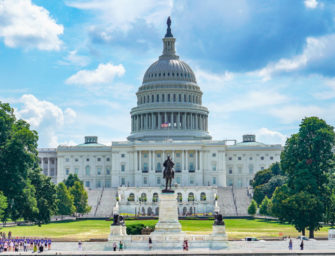100 days in, Biden administration shows strong commitment to science
This Friday, 30 April, marks U.S. President Biden’s 100th day in office. The new administration has shown a strong commitment to science, including elevating the Office of Science and Technology Policy to a cabinet-level position, rejoining the Paris Agreement, committing to reducing U.S. emissions by about 50% below 2005 levels by 2030, as well as laying out how the administration will address the world’s climate crisis.
The administration has made progress on many of AGU’s key priorities for the U.S. to combat climate change, elevate the role of science and support a strong, diverse and inclusive scientific workforce that we laid out in a First 100 Days Memo to the Biden-Harris transition team in December. A closer look at the progress made by the Biden administration on AGU’s U.S. policy priority areas so far is detailed below.
Climate change
During his campaign, President Biden put climate change front and center, emphasizing the importance of immediate action, incorporating climate change mitigation strategies and including climate change as a priority in each federal agency.
One of the first actions Biden took was to issue an order calling for the U.S. to rejoin the Paris Climate Agreement, which officially went into effect on 19 February. Biden also created new positions for National Climate Advisor and the Special Presidential Envoy for Climate to oversee all domestic and international climate issues. He also established a National Climate Task Force across over 20 agencies and departments.
As of Earth Day on 22 April, the Administration held a summit of international climate leaders at which they committed to reducing U.S. emissions by 50% below 2005 levels by 2030 and laid out some specific approaches. The details of the pathway to achieve those reductions is not yet fully clear, as many steps will take congressional action. AGU looks forward to working with the administration and Congress to achieve these goals.
Elevating the role of science
President Biden expressed a strong desire to ensure that science is at the forefront of major policy decisions, especially as his Administration works to curb the COVID-19 pandemic.
He elevated the Director of the Office of Science and Technology Policy (OSTP), which handles science issues within the Executive Office, to a cabinet-level position. Science groups, including AGU, have long advocated for the OSTP Director to be raised to this level—signifying the importance of bringing science solutions to the table. Biden also created two new positions within OSTP—the Deputy Director for Science and Society and the Deputy Director for Climate and the Environment.
The Environmental Protection Agency (EPA) announced it would reconstitute its Scientific Advisory Board, dismissing all current appointees (with the opportunity to reapply), and changing a policy created during the previous administration to ensure that recipients of EPA grants are once again eligible to apply to the Board.
President Biden released his preliminary Fiscal Year 2022 budget on 9 April, which included significant funding requests for key science agencies such as the National Aeronautics and Space Administration (NASA), the National Oceanic and Atmospheric Administration (NOAA) and EPA. AGU looks forward to working with Congress to pass strong funding for science.
Diverse scientific workforce
Biden promised commitment to diversity, which he has delivered on in the diversity of his cabinet heads and rescinding an executive order from the previous administration that prohibited federal agencies, contractors and grantees from holding diversity training.
International science collaboration
There are several immigration regulations that impact our scientific community in the U.S. and across the globe.
In the early months of the COVID-19 pandemic, the Department of Homeland Security (DHS) announced that international students studying with the Student and Exchange Visitor Program would not be allowed to return to the U.S. unless their institutions were offering in-person classes. The decision was reversed after much public outcry. AGU is pleased to see that guidance for the 2021-2022 academic school year was issued on 26 April 2021, which will extend guidance issued in March 2020.
Several regulations not finalized before President Trump left office are currently on hold due to a regulatory freeze. One such rule would eliminate the so-called “Duration of Status” for international students. This regulation would put stricter limits on visas for international students, reducing their length of stay to a maximum of four years (two for certain programs), making it difficult for some international students to finish a full course of study. We urge the Biden administration and DHS Secretary Mayorkas to officially nullify this and similar regulations to help foster international scientific collaboration.
AGU applauds the Biden Administration’s steps to remedy the challenges we face, as well as the disproportionate health and environmental effects suffered by underrepresented minorities. We also stand ready to work with the administration on additional areas, including efforts to reduce emissions and support international scientific collaboration.
We urge all AGU members to get involved in advocating for strong science policy including:
- Signing AGU’s letter urging the administration to reject any changes to the Duration of Status program.
- Letting AGU know about relationships you may have with your local or national policymakers so we can help you leverage your voice as part of the AGU community.
- Helping create a more just, equitable, diverse and inclusive scientific community by asking your policymakers to sign onto key legislation, like the STEM Opportunities Act or the Supporting Early Career Researchers Act
By working together, we can ensure that policymakers around the world hear from and respond to the collective voice of the Earth and space sciences community.



There are no comments
Add yours